Book 4 module1讲与练教师版
Module 4 Unit 1小学一年级英语教案

Module 4 Unit 1小学一年级英语教案教学目标1.学生能正确说出以下单词:apple, banana, pear, orange。
2.学生能使用英语表达“我喜欢…”3.学生能理解并回答关于喜欢的英语问题,例如“Do you like apples?”教学准备1.单词卡片:apple, banana, pear, orange2.图片、卡通贴画等教具3.CD机和录音CD4.课本和练习册教学步骤Step 1:引入在引入时,可以使用图片、卡通贴画等教具,让学生对水果有一个直观的认识。
教师可以把水果从教师桌上拿出来,和学生共同观察。
先问(看):What fruit is this? 然后教师可以边出示卡片边读单词,慢慢教会学生apple、banana、pear、orange这四个单词。
教师可以通过比较这四种水果的颜色、形状、口感和味道等,让学生了解水果的不同特点。
例如:•Apple is red, yellow or green. It’s round and firm. It’s juicy and sweet.•Banana is yellow. It’s long and curved. It’s soft and sweet.•Pear is green or yellow. It’s pear-shaped. It’s juicy and juicy and sweet.•Orange is orange. It’s round. It’s juicy and sour.Step 2:教授问答教师可以使用手势和肢体语言帮助学生理解以下问答。
Q: What fruit do you like?A: I like apples/bananas/pears/oranges.教师可以把这个问答反复练习、模仿。
在这个活动中,可以训练学生音标的发音、认读字母和单词,也可训练学生的听力和口语表达能力。
Book4 Module1 Unit1 Work with Language 教学设计

Book4 Module1 Unit1 Work with Language 教学设计Book4 Module1 Unit1 Work ith Language 教学设计Team 备课班级组Grade FourDesigner执笔吴清敏Module/Topic模块及话题Module 1AgeUnit单元Unit1Dims AgeTitle题目Dims AgePeriod课时1Type of lesson课型Work With LanguageObjectives:教学目标1.巩固所学的人名单词和动词及短语2.娴熟运用Whatre you doing? Im Ving Whats xxx /he/she doing? xxx/Hes/Shes doingIs he/she doing?及回答于语言交际中Emphasis, Difficulties Analysis And Teaching Previe重难点分析与教学预设:1.现在进行时句式的教学以及动词现在分词的变化形式2.人名,动词现在分词形式的发音Teaching Resource教学资源同学的活动相片,动词及短语图片,电脑课件Preparation For Lessons相关前置性学习Teaching Procedures教学过程Teaching activity Im having a happy time(同学唱着问Whatre you doing?,老师边做动作边回答Im V-ing,然后老师与同学的角色对换)revie singing,having a happy time Whatre you doing? Im doing 板书Whatre you doing? Im doing 利用图进行机械操练和替换练习2.结合同学们的图片或相片小组开火车形式,操练Im V-ing,Whatre you doing? Im Ving 看哪组最快3.老师说动词现在分词形式,同学说出动词的原形,如:flyingfly skatingskate,skippingskip(然后老师与同学的角色对换)4老师说动词短语现在分词形式,同学说出动词短语的原形,如:having breakfast/lunch/dinnerhave breakfast/lunch/dinner, chasing a dogchase a dog, doing houseorkdo houseork.. (然后老师与同学的角色对换),5全班齐读动词及短语,同伴之间操练6 利用班中同学的活动相片,引出老师与优生的问答Whats he/She doing? He s/ Shes doing Is he/she doing?及回答7板书Whats he/She doing? He s/ Shes doing 进行机械操练和替换练习8 A guessing game 看课件老师与同学之间,(四人组同学之间)问答Whats he/She doing? He s/ Shes doing Is he/she doing?(看谁能猜准动作)三.Conclusion1在老师的启发诱导下,分析现在进行时的意义行为动作发生的时间同学归纳后,老师予以确定或补充2归纳现在进行时的构成3归纳现在分词的构成四Consolidation and developement1同学依照语法规章完成活动手册P2练习2 ,32口、笔头将现在进行时的确定句改为否定句、特别疑问句和一般疑问句,再做确定或否定回答。
Book4Module4Unit1教学设计
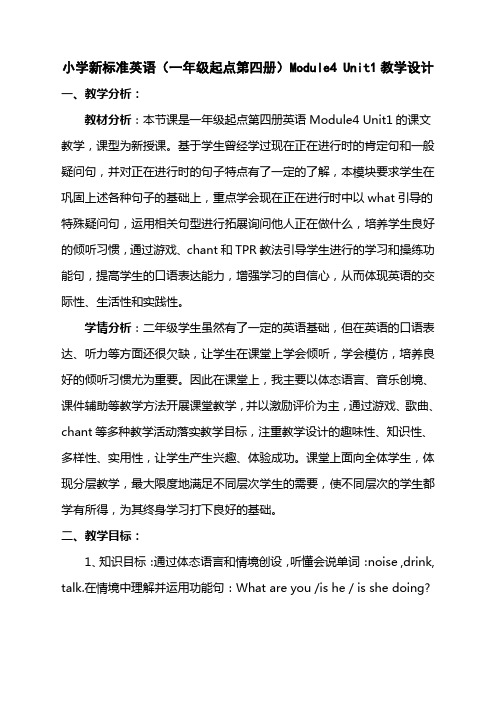
小学新标准英语(一年级起点第四册)Module4 Unit1教学设计一、教学分析:教材分析:本节课是一年级起点第四册英语Module4 Unit1的课文教学,课型为新授课。
基于学生曾经学过现在正在进行时的肯定句和一般疑问句,并对正在进行时的句子特点有了一定的了解,本模块要求学生在巩固上述各种句子的基础上,重点学会现在正在进行时中以what引导的特殊疑问句,运用相关句型进行拓展询问他人正在做什么,培养学生良好的倾听习惯,通过游戏、chant和TPR教法引导学生进行的学习和操练功能句,提高学生的口语表达能力,增强学习的自信心,从而体现英语的交际性、生活性和实践性。
学情分析:二年级学生虽然有了一定的英语基础,但在英语的口语表达、听力等方面还很欠缺,让学生在课堂上学会倾听,学会模仿,培养良好的倾听习惯尤为重要。
因此在课堂上,我主要以体态语言、音乐创境、课件辅助等教学方法开展课堂教学,并以激励评价为主,通过游戏、歌曲、chant等多种教学活动落实教学目标,注重教学设计的趣味性、知识性、多样性、实用性,让学生产生兴趣、体验成功。
课堂上面向全体学生,体现分层教学,最大限度地满足不同层次学生的需要,使不同层次的学生都学有所得,为其终身学习打下良好的基础。
二、教学目标:1、知识目标:通过体态语言和情境创设,听懂会说单词:noise ,drink, talk.在情境中理解并运用功能句:What are you /is he / is she doing?2、能力目标:能在语境和情境中运用功能句进行简单的有关他人在做什么的话题描述。
3、情感、态度、价值观:在活动中,学生学会运用所学知识进行交流,并在交流中学会关心他人,体验合作、参与的乐趣。
三、教学重点:1、听懂会说noise, drink, talk等词以及drink, talk的现在分词:drinking, talking.2、听懂、会说、理解功能句What are you / is he / is she doing?四、教学难点:能用功能句进行简单的交流,关注他人行为。
book4 module1 unit1教学设计教案(1)

T: Good morning pupils
2 Revise chant of last class learning
II.Leading-in
Draw a simple route picture. And help the students say out: next to ,in front of.
Listen and repeat
IV.Further Development
Action
1)divide four team.
2)Make somesentences.
V.Homework
以小组为单位编写关于finding places的对话。
Students’Activity
Ss: Good morning teacher.
Listen and repeat.
Read the text
Action.
Say sentences.
Do honework at home.
Re-preparation
Feed back
教学反馈
Say and do the actions
Look and say.
Open book.
Listen and look.
Listen and act.
Look、listen and answer
It’s turn left.It’s next to the park.
It’s in front of the schoo源自.Teaching Plan
School:长大小学Name:张鹤
Title
课题
NSE Book4 Module10 Unit1
Module4Unit1Let'smakeahomelibrary(教案)-五年级英语下学期(三起)
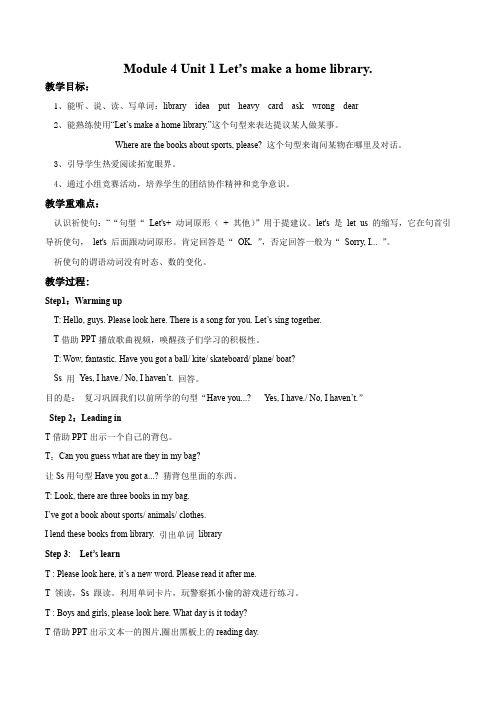
Module 4 Unit 1 Let’s make a home library.教学目标:1、能听、说、读、写单词:library idea put heavy card ask wrong dear2、能熟练使用“Let’s make a home library.”这个句型来表达提议某人做某事。
Where are the books about sports, please? 这个句型来询问某物在哪里及对话。
3、引导学生热爱阅读拓宽眼界。
4、通过小组竞赛活动,培养学生的团结协作精神和竞争意识。
教学重难点:认识祈使句:““句型“Let's+ 动词原形(+ 其他)”用于提建议。
let's是let us 的缩写,它在句首引导祈使句,let's 后面跟动词原形。
肯定回答是“OK. ”,否定回答一般为“Sorry, I... ”。
祈使句的谓语动词没有时态、数的变化。
教学过程:Step1:Warming upT: Hello, guys. Please look here. There is a song for you. Let’s sing together.T借助PPT播放歌曲视频,唤醒孩子们学习的积极性。
T: Wow, fantastic. Have you got a ball/ kite/ skateboard/ plane/ boat?Ss 用Yes, I have./ No, I haven’t. 回答。
目的是:复习巩固我们以前所学的句型“Have you...? Yes, I have./ No, I haven’t.”Step 2:Leading inT借助PPT出示一个自己的背包。
T:Can you guess what are they in my bag?让Ss用句型Have you got a...? 猜背包里面的东西。
T: Look, there are three books in my bag.I’ve got a book about sports/ animals/ clothes.I lend these books from library. 引出单词libraryStep 3: Let’s learnT : Please look here, it’s a new word. Please read it after me.T 领读,Ss 跟读。
外研版英语七年级上册Module4Unit1《We’vegotlotsofapples》说课稿

外研版英语七年级上册Module 4 Unit 1《We’ve got lots of apples》说课稿一. 教材分析外研版英语七年级上册Module 4 Unit 1《We’ve got lots of apples》是一篇关于日常生活中的水果话题的阅读材料。
通过学习本节课,学生可以掌握一般现在时态的用法,学会使用There be句型和have got句型描述物品的数量,以及使用how many和how much提问数量。
此外,本节课还引入了新的水果词汇,如apples, oranges, pears, bananas等。
二. 学情分析七年级的学生已经掌握了基本的英语语法知识,对日常生活中的常用词汇有一定的了解。
但是,部分学生可能对一般现在时态的用法还不够熟练,同时对于如何运用There be句型和have got句型描述物品数量还需进一步巩固。
因此,在教学过程中,教师需要关注学生的学习需求,针对性地进行讲解和辅导。
三. 说教学目标1.知识目标:学生能够掌握一般现在时态的用法,学会使用There be句型和have got句型描述物品的数量,以及使用how many和how much提问数量。
2.能力目标:学生能够运用所学知识进行简单的交流,如询问和描述水果的数量。
3.情感目标:通过学习本节课,学生能够培养对英语学习的兴趣,增强自信心。
四. 说教学重难点1.重点:一般现在时态的用法,There be句型和have got句型的运用。
2.难点:如何正确使用how many和how much提问数量。
五. 说教学方法与手段1.任务型教学法:通过设置各种任务,激发学生的学习兴趣,提高学生的参与度。
2.情境教学法:创设生活情境,让学生在实际情境中运用所学知识。
3.直观教学法:利用图片、实物等直观教具,帮助学生更好地理解和学习。
4.信息技术辅助教学:利用多媒体课件和网络资源,丰富教学内容,提高教学效果。
MK_外研版小学英语四年级上册Module4Unit1精讲精练
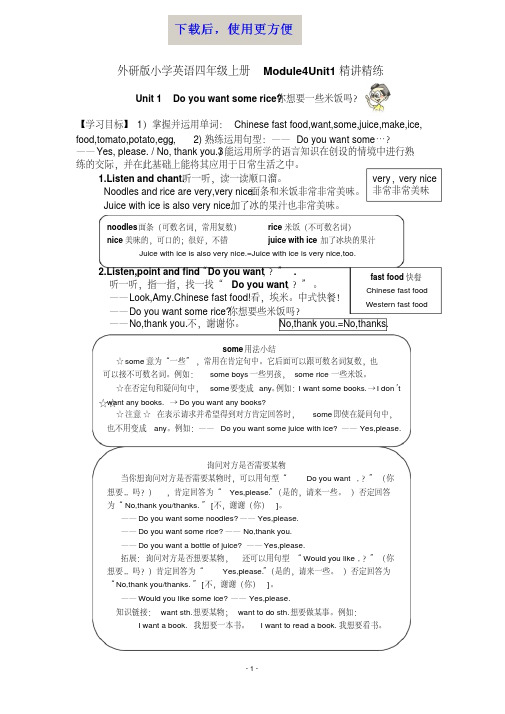
外研版小学英语四年级上册Module4Unit1精讲精练Unit 1 Do you want some rice?你想要一些米饭吗?【学习目标】1)掌握并运用单词:Chinese fast food,want,some,juice,make,ice, food,tomato,potato,egg ,, 2) 熟练运用句型:——Do you want some …?——Yes, please. / No, thank you.3)能运用所学的语言知识在创设的情境中进行熟练的交际,并在此基础上能将其应用于日常生活之中。
1.Listen and chant.听一听,读一读顺口溜。
Noodles and rice are very,very nice.面条和米饭非常非常美味。
Juice with ice is also very nice.加了冰的果汁也非常美味。
2.Listen,point and find “Do you want ,?”. 听一听,指一指,找一找“Do you want ,?”。
——Look,Amy.Chinese fast food!看,埃米。
中式快餐!——Do you want some rice?你想要些米饭吗?——No,thank you.不,谢谢你。
No,thank you.=No,thanks.☆☆noodles 面条(可数名词,常用复数)rice 米饭(不可数名词)nice 美味的,可口的;很好,不错juice with ice 加了冰块的果汁Juice with ice is also very nice.=Juice with ice is very nice,too.very ,very nice 非常非常美味fast food 快餐Chinese fast food Western fast food some 用法小结☆some 意为“一些”,常用在肯定句中。
高中英语真题:Book4module1
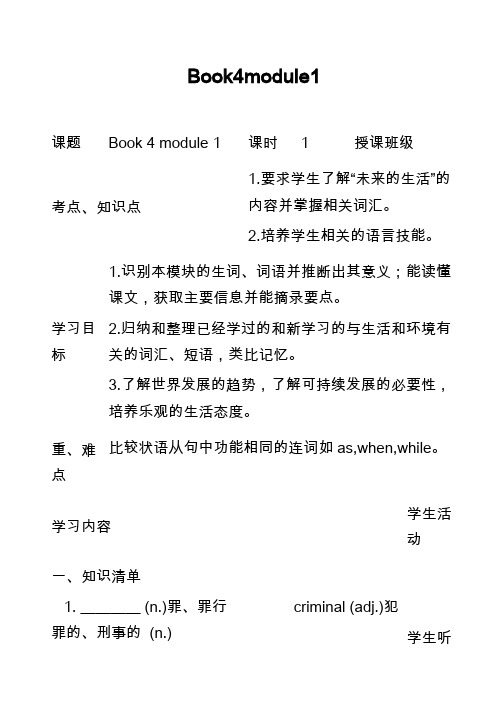
Book4module1课题Book 4 module 1课时1授课班级考点、知识点1.要求学生了解“未来的生活”的内容并掌握相关词汇。
2.培养学生相关的语言技能。
学习目标1.识别本模块的生词、词语并推断出其意义;能读懂课文,获取主要信息并能摘录要点。
2.归纳和整理已经学过的和新学习的与生活和环境有关的词汇、短语,类比记忆。
3.了解世界发展的趋势,了解可持续发展的必要性,培养乐观的生活态度。
重、难点比较状语从句中功能相同的连词如as,when,while。
学习内容学生活动一、知识清单1. ________ (n.)罪、罪行 criminal (adj.)犯罪的、刑事的 (n.) 学生听2. prediction (n.)________ ________ (vt.)预言、预料3. charge(n.)________ charge (v.)要(人)支付(多少钱)、控告、充电in charge of 负责、主管(表主动) in the charge of 由...管理(表被动)free of charge = for free4. ________ (vt.) 供给动力 power (n.) 能力、力量、动力、权力5. ________(vt.)系、贴、连接 attach sth. to sth. 将某物系/附在另一物上attach to sth./sb.与某事有关联 attach oneself to sb./sth. 依附某人/参加某事6. urban (adj.) rural (adj.)乡村的7. optimistic (adj.) ________ pessimistic (adj .)悲观的8. ________ (n.) 范围(常作复数) limit (vt.)限定、限制be limited to...局限于... limit sb. to (doing) sth.限制某人(做)...9. switch (n.) switch (vi.)转换、交换教师讲授英语句子成分学生练习句子成分的分析switch on = turn on switch off = turn off10. for sure run out (vi.) 主语为物run out of (vt.) 用完(主语为人)look out on the way outrely on get rid ofuse up for a start11. (adv.)无疑地、确定地 (adv.)最后、终于12. fire (vt.) load (vt.)shape (vt.)二. 课前预习Task 1.详见课本P1 第二题Task 2.详见课本 P3 第一题课中探究案(合作、交流、展示、点评)Task 1. Fast-reading(1).True or false①.Police will arrest criminals by guns.( )②.Smoking will be allowed in the city. ( )学生听教师讲授英语五种基本句型学生尝③.People have to pay for recreation. ( )④.People will keep their telephone number for life. ( )Task 2. Careful-reading(1).Scan the text and then choose the best answer according to the text.① Why is making predictions about the future city a risky business?A.Care for the environment is more important. B.Alternative energy is hard to find.C.The city of the future will get bigger.D.What the city of the future looks like is not certain .②When will a man get his telephone number in the future?A.When he is 18 years old. B.When he is 14 ye ars old.C.When he gets married. D.When he was bor n.③Which is NOT true in the year 2025 according to t 试自主分析五种基本句型he text?A.No smoking. B.Batman nets. C.Garbage ships. D.Cars powered by wind.④Why do people care more about the environment in the future?A.Because they can use recycled materials. B.Because they have improved the sense of enviro nment.C.Because the earth’s natural resources run out. D.Because there are more people in the world.⑤What can you do in the year 2025?A.You can go shopping in the malls.B.You can entertain freely.C.You have to go to hospital to get operated. D.You can smoke in your own room.(2).Answer the questions.①.What have students in a Texas university done? (No more than 10 words)__________________________________________ ____________________②.Where will garbage ships go? (No more than 3 words)______________________________________________ ________________③.Who will batman nets catch? (No more than 1 wor d)___________________________________________ ___________________④.Where won’t people be allowed to smoke? (No m ore than 4 words)____________________________________________ _______________________________________________________________ _________________Task 3. Post-readingWhat will the city of the future be like? One ______ is certain about the future city—they are going to get bigger before they get smaller. Here are _____ of the ideas for running a city of 50,0 00 people in the year 2025. To get rid of garbage pro blems, _____ city will load huge spaceships with wast e materials and send them towards the sun, _____ la ndfill / and environmental problems.Nets Police will arrest criminals by firing nets _____ of guns. No smoking will be allowed within a future city’s limits. In the future all ____will be done online, andcatalogues will have voice commands to place orders. Everyone ____ be given a telephone number at birth that will never change no matter where they live.Nets Police will arrest criminals by firing nets _____ of guns. No smoking will be allowed within a future city’s limits. In the future all ____will be done online, andcatalogues will have voice commands to place orders. Everyone ____ be given a telephone number at birth that will never change no matter where they live.教学反思课题Book 4 module 1课时2授课班级考点、知识点1.要求学生了解“未来的生活”的内容并掌握相关词汇。
Book1 M4 1 2 教案
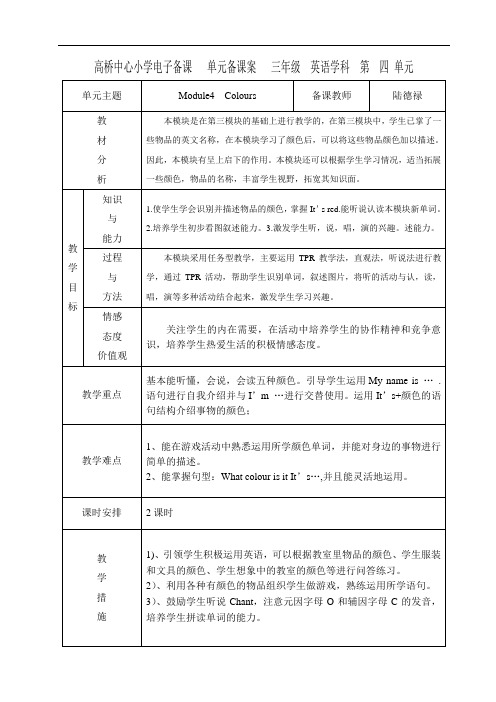
b.炮仗游戏:把全班分成五个小组,每组代表一种颜色。比如请Red Group一位同学站起来说Red bomb blue.那么Blue组的同学必须立刻举起手来,缤纷马上说出Blue的拼写。Blue组的同学谁表现得最好,便又可站起来说:“Blue bomb XX.”以此类推.
情感
态度
价值观
关注学生的内在需要,在活动中培养学生的协作精神和竞争意识,培养学生热爱生活的积极情感态度。
教学重点
基本能听懂,会说,会读五种颜色。引导学生运用My name is….语句进行自我介绍并与I’m…进行交替使用。运用It’s+颜色的语句结构介绍事物的颜色;
教学难点
1、能在游戏活动中熟悉运用所学颜色单词,并能对身边的事物进行简单的描述。
b.齐唱Good morning
c.Let’s chant. T: Walk, walk, let’s walk; Run, run, let’s run; Jump, jump, let’s jump; Fly, fly, let’s fly.
Step
Look andsay.
T: What’s this?
2、能掌握句型:What colour is it It’s…,并且能灵活地运用。
课时安排
2课时
教
学
措
施
1)、引领学生积极运用英语,可以根据教室里物品的颜色、学生服装和文具的颜色、学生想象中的教室的颜色等进行问答练习。
2)、利用各种有颜色的物品组织学生做游戏,熟练运用所学语句。
3)、鼓励学生听说Chant,注意元因字母O和辅因字母C的发音,培养学生拼读单词的能力。
情感态度
价值观
培养学生对美术、音乐的欣赏,以及合作的精神。
英语第四册第一模块

c)Choose an individual student to stand up. Introduce him/her to the class. Use the dialogue:
b)Explain that they have to listen and tell you the names of the characters in the story.
c)Play the tape. Have them tell you the names and make a list on the board. Note that although Panpan is doing the talking, his name is not mentioned.
c)Do more exercises with the class and also with individual student.
3、Point and say.
a)Hold up the book. Explain that you are going to point to one of the characters in it. You are going to make a statement about this character using an adjective. The students have to agree or disagree with your statement.
a)Describe the pictures. Play the tape, and then repeat the words.
Module4Unit1-1教案-

4.学习能力:鼓励学生在小组活动中积极合作、互帮互助,提高自主学习能力,形成有效的学习策略。
注意:以上核心素养目标与教材内容紧密关联,符合新教材要求,旨在全面提升学生的英语学科素养。
三、教学难点与重点
1.教学重点
-词汇在不同情境下的应用:学生需要学会如何根据语境选择合适的词汇来表达日常习惯。
举例:
-解释为什么在句子“ She always goes to school by bus.”中,动词“go”变为“goes”。
-对比“often”和“usually”的用法,如:“I often play sports on weekends.”与“I usually go to bed at10 p.m.”之间的区别。
四、教学流程
(一)导入新课
同学们,今天我们将要学习的是Module 4 Unit 1 -1的内容。在开始之前,我想先问大家一个问题:“你们在日常生活中是如何描述自己的日常习惯的?”例如,你通常早上做什么?这个问题与我们将要学习的一般现在时态密切相关。通过这个问题,我希望能够引起大家的兴趣和好奇心,让我们一同探索时态的奥秘。
-指导学生如何根据实际情况将句子中的时间状语替换,如:“What do you do in the morning?”可改为“What do you do after school?”。
-通过角色扮演等活动帮助学生理解词汇在不同情境下的运用,如谈论家庭成员的习惯时使用“Does your mother always cook dinner?”。
-重点词汇的用法:教授habit, usually, often, always, never等词汇在句子中的正确使用。
英语外研版必修四Module1新教学教案(2)

Let’s guess what the topics, do you think, the passage will mention.
alternative energy,crime,school,public service,
traffic,environment,weather,entertainment
3. Discuss in pairs, then choose your answer or answers and tell the class why.
4.Look at thesampleson screen.
Step two
Pre-reading
1. Work in pairs
Ask students to look at the questions before readingthe text.
2. Look at the screen and check the answers.
3. Match the words and phrases in the box A with those in box B.
Do theexercises individually and pay attention to the words where the stress doesn’t fall on the first syllable, then match them:
5. They will go shopping online.
6. Their telephone number.
7. Recreation.
8. All cars will be powered by electricity, solar energy and wind.
- 1、下载文档前请自行甄别文档内容的完整性,平台不提供额外的编辑、内容补充、找答案等附加服务。
- 2、"仅部分预览"的文档,不可在线预览部分如存在完整性等问题,可反馈申请退款(可完整预览的文档不适用该条件!)。
- 3、如文档侵犯您的权益,请联系客服反馈,我们会尽快为您处理(人工客服工作时间:9:00-18:30)。
Book 4 module 1讲与练in the future/ in future, get rid of, for sure/ for certain, run out/run out of, use up rely on, carry out, at birth, place (orders) an order(for), free of charge, , come true, in progress, on the way out, not all….,1.in the future/ in future2.for sure/ for certain,It is____ that they are making preparation for the sports meet.A. sure of B certain of C certain D sure 选C在“It is…that结构中只能用certain,不能用sure。
1)It is certain that he will come.It was certain that our football team would win the game.2)I’m sure /certain that………..3)I’m not sure/certain whether…..I’m not sure/certain whether I’ve met him before.I’m not sure/certain whether he will come.I’m not sure/certain who he is.I was not sure/certain what I ought to do.I’m not sure/certain why he wants it.4) be sure /certain to do sth /of doing sth5) make sure/certain (of)/ for sure/certainI don’t know for sure/certain that he’s dead.I cannot say for sure/certain when he will come.6).当certain表示“某一”“某些”时= someA certain Mr. Green wants to see you. 有个叫格林先生的人想见你。
=Some Mr. Green wants to see you.Certain /Some plants are good to eat but others are not.3. run out/run out of/use up/give out,2)use up, run out of有被动give out, run out 无被动With drink and food___,the farmer had to walk out of the cave.A、run outB、use upC、run out ofD、using up4 . rely on /depend on1).when we will hold the flower show in the park mainly _____ the weatherrecently. A. lies on B puts on C relies on D depends on2)—How long are you staying?—I don’t know. _______.(江苏2004)A. That’s OKB. Never mindC. It dependsD. It doesn’t matter(P46)Future agriculture should depend on high technology as well as traditional methods.说明:depend on/ upon一般不用于进行时.1.依靠;依赖;指望”,(1)后接名词或代词。
We shouldn’t depend on foreign countries for oil.The map is a thing to be depended on when you are in a strange place.(2)后接带不定式的复合结构,即depend on/ upon sb. to do sth., 意思是“指望某人做某事”,可转换为depend on one(’s) doing sth.。
You can’t depend on them to do it. = You can’t depend on their/ them doing it.(3)用于“depend on / upon it + that从句”这一结构,意思是“指望……;对……不怀疑”。
You may depend on it that they will be there in time.2. 表示“视……而定;取决于……”,(1)后接名词或代词作宾语。
The price depends on the quality.价钱取决于质量。
(2)后接how或wh-引起的从句,在口语中可省略on或upon。
Your success depends (on) whether you work hard or not.3. 常用短语(1)depend upon/ on it表示“无疑地;的确”,为副词性短语,主要用于口语中,通常放在句首或句末;或用作动词性短语,表示“相信”。
Depend on it, they will pass the examination.请放心,他们一定会通过考试的。
(2)That (all) depends = It (all) depends,意思是“这很难说;那得看情况(而定)”,主要用于口语中。
rely upon it that…….= depend on / upon it + that…….1.Don't rely upon him to finish the work today.2.You may rely upon it that he will be early .他靠得住,会早到的。
3.You may rely upon it that he will come on time. 你可以放心,他会准时到的。
4.You may rely upon it they will come and join you.4. carry out1)Sometimes the police wear casual clothes to ____ special tasks.A. carry offB. carry onC. carry withD. carry out2)The managers discussed the plan that they would like to see ____the next year.(2000’)A, carry out B, carrying out C, carried out D, to carry out可以看出这是see the plan carried out,宾补关系,但为被动,故选5. alternative1.n. 可供选择的事物,替代物adj. 选择性的,,标新立异的( 1). There are several alternative greeting cards here. 这有几张新颖的贺卡。
(2). It is an alternative lifestyle. 这是一种超越古今的生活方式。
(3).There are several alternatives to your plan.有好几个可以代替你的计划的方案)。
2. alternative=choice have no choice but to do=have no alternative but to do 误:I had no alternative but report him to the police.正:I had no alternative but to report him to the police.正:There is no alternative for him ,but to work hard.正:I had no alternative but to go.误:He had no alternative to stay at home.正:He had no alternative to staying at home.析:have no alternative but to do sth 意为“除了做某事外没有其它的办法”,but 后通常接带to 不定式。
析:have no alternative to(介词)doing sth= have no alternative but to do sth将来进行时将来进行时常用来表示说话人设想已经安排好的事。
构成: will be doingII.常用的时间状语soon, tomorrow, this evening,on Sunday, by this time,tomorrow, in two days, tomorrow eveningIII. 将来进行时的用法将来进行时练习1.You wo n’t miss him. He a dark suit and a yellow tie waiting for you.A. is wearing B will wear C. wears D. will be wearing2.”Could you give these books to Mr. Black?”“Absolutely,him at five o’clock this afternoon.”A.I will have a talkB.I have a talk withC.I can have a talk withD.I will be having a talk with3.I’m afraid I won’t be available. I a friend off at o’clock this afternoon.A. seeB. am seeingC. will seeD. will be seeing4.Next Friday I will go to another concert .They ____some thing by Mozart at that time. A. play B. will be playing C. are going to play D. are to play.5.”What are you doing ,Jack?”“Make a model plane . I ____it in the science class at 10 o’clock tomorrow morning.”A. will be showingB. am going to showC. showD. showed6.I_____ a meeting at 4o’clock tomorrow afternoon.A. will be havingB. am havingC. am going to haveD. have7’What do you think you _____at this time next year?A. will doB. will be doingC. are going to doD. do8.”What will you do tomorrow evening?”“I _____my favorite program at eight o’clock tomorrow evening.”A. will watchB. am going to watchC. will be watchingD. am watching1D2D 3.D4.B5.A6.B7.B8.C9. What____ you_____ this time tomorrow?A will…doB will…have doneC will…be doneD will…be doing10. The street lights____ on when night falls.A will have goneB will have been goingC will be goingD will be gone11. Joe____ the piano in a few minutes.A shall be playedB will have been playingC shall be playingD will have played12. I ____ my grandmother at three this afternoon.A shall be visitingB shall have visitedC shall be visitingD will visit13. “Can you attend the party tonight?”“No,_____ the boss about something urgent.”A I see B. I shall have seen C. I’ll be seeing D I can see。
